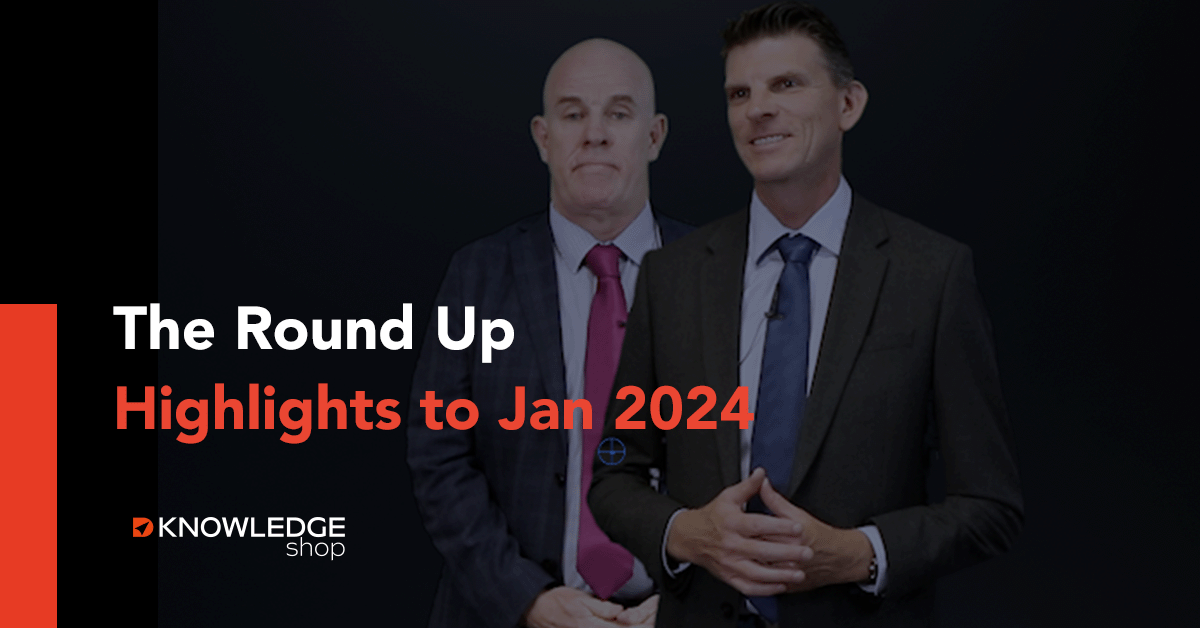September 2025 Round Up | ATO 2025-26 focus areas and a warning on the deadline for claiming GST credits
The ATO has announced its 2025-26 areas of focus for privately owned and wealthy groups. The ATO continues to focus on trusts and has raised a specific concern when it comes to applying the 45-day holding rule for franking credits in newly incorporated bucket companies.
An Administrative Review Tribunal decision also serves as a warning on the strict deadline that needs to be considered when it comes to claiming GST credits.
Change is a constant for the profession. The Knowledge Shop membership can help you and your team keep ahead of change with an advisers' help desk, workpaper knowledge base, quarterly PD, and more - wherever you are and however you are working. Book in a time for a tour or call the Knowledge Shop team on 1300 378 950.
Inside this month, Ann Dai (Tax Adviser), Michael Carruthers (Tax Director) and Amy Yan (Associate Tax Director) bring you:
2025-26 ATO areas of focus for privately owned and wealthy groups
The ATO has issued website guidance on its key focus areas for privately owned and wealthy groups. The ATO tends to release a summary of key focus areas each financial year. This information can serve as a useful reminder to practitioners of key issues to consider when working through year-end compliance jobs for clients, when looking at the tax treatment of one-off events and when looking at possible tax planning opportunities.
While many of the items on the ATO’s list would be familiar to practitioners who have referred to these guides in previous years, there are some specific items that are worth mentioning.
First, we continue to see an increased level of scrutiny when it comes to possible family trust distribution tax (FTDT) issues. As many practitioners would be aware, when a trust makes family trust election this opens up access to a range of concessions within the tax system. However, FTDT can be triggered if the trust makes a distribution outside the family group of the relevant test individual. FTDT is basically 47% of the amount of the distribution, with general interest charge accruing on unpaid amounts. One of the key issues with FTDT is that there is no time limit on the ATO seeking recovery of FTDT liabilities.
Second, the ATO makes reference to concerns with restructures that are undertaken in order to access concessions that would not otherwise be available. While the ATO doesn’t expand on this, presumably this would include situations where clients change the way a group is structured in order to access the small business CGT concessions. We have seen instances in the past of the ATO seeking to apply the general anti-avoidance rules in Part IVA to situations involving group restructures which appear to enable access to concessions that wouldn’t otherwise be available.
Third, the ATO indicates that it is focusing on situations where a trust receives a franked dividend, which is then distributed to a corporate beneficiary that was incorporated after the original dividend was paid. We have heard from multiple sources that the ATO has been looking at this issue closely in review and audit activities this year. The ATO seems to take the view that the corporate beneficiary can’t pass the 45 day holding period rule to access the franking credits if it didn’t exist when the original dividend was paid, even if the trust held the shares in the company paying the dividend for more than 45 days and has a family trust election in place.
Reporting account balances and other annual amounts
The ATO is reminding superannuation funds to report the 30 June 2025 account balances and other annual amounts by 31 October 2025, using the member account transaction service (MATS).
This includes reporting the superannuation accumulation account balances, notional taxed contributions, and defined benefit contributions.
Before lodging annual member account data through MATS, funds should ensure that each active member’s account has been reported through the member account attribute service and that the member’s identity details are correct. Where a defined benefit member closes their account before 30 June 2025 due to a successor fund transfer, the transferring fund must report pro-rata notional taxed contributions and defined benefit contributions, and must report a zero account balance at 30 June 2025.
Superannuation funds are required to correct any errors or omissions in the 30 June 2025 account balance within 30 days of becoming aware of the issue. Corrections can be made either by cancelling the original transaction and submitting a new MATS form with the correct information, or by overwriting the amounts reported and lodging a MATS with the corrected figures using the same balance date.
When making amendments, superannuation accumulation account balances, notional taxed contributions and defined benefit contribution amounts will default to zero. To avoid adverse impacts on member calculations, funds should ensure that the amounts originally reported are re-entered along with the corrected balance.
GST and voucher sales
The ATO has updated its website guidance on applying GST to ‘face value vouchers’ and ‘non-face value vouchers’.
A face value voucher is one that can be redeemed for a reasonable choice of goods and services. For face value vouchers, you only account for GST when the voucher is redeemed for taxable goods and services, not at the time that the voucher is sold. This is because the sale of a face value voucher for an amount not exceeding its face value is not a taxable supply.
If the face value voucher expires or is not fully redeemed, then an increasing adjustment will generally need to be made on 1/11th of the unredeemed balance.
If you buy a face value voucher and use it to acquire something for business purposes that is subject to GST, then you would normally claim GST credits when the voucher is redeemed, not when the voucher is purchased.
A non-face value voucher can only be redeemed for specific goods and services. GST applies at the time the non-face value voucher is sold, but only if it is redeemable for taxable supplies. When purchasing a non-face value voucher, you claim GST credits in your BAS for the reporting period when the voucher is bought.
Four-year time limit for claiming GST credits
The ART has confirmed that taxpayers are not entitled to claim GST credits in GST returns lodged more than four years after their due date. The ART held that under section 93-5 of the GST Act, a taxpayer ceases to be entitled to a GST credit if it has not been taken into account within four years of the original lodgment due date.
The taxpayer in this case, a swimming pool construction business, fell behind in its BAS lodgments in 2012 and 2013, and did not lodge the outstanding returns until 2018. The returns included claims for GST credits, which the Commissioner disallowed following an audit.
The taxpayer argued that the four-year limit had no application in the context of an objection or review, relying on some comments made in Coles Supermarkets v FCT. The taxpayer also claimed that the ATO had effectively granted an extension of time through correspondence with its officers.
The ART rejected these arguments and affirmed the Commissioner’s decision. It held that accepting the taxpayer’s position would allow GST credit claims many years, or even decades, after the relevant period, which was inconsistent with the clear language of section 93-5. The Tribunal also found no evidence that the Commissioner had extended the time for lodgment, with ATO correspondence merely recording agreed dates for lodgment.
Once the four-year period in section 93-5 has expired, a taxpayer’s entitlement is extinguished.
The ART decision reflects the ATO’s views set out in MT 2024/1 that the four-year time limit is to be applied strictly.
- The Trustee for the Barth Family Trust and Commissioner of Taxation (Taxation) [2025] ARTA 1558 (28 August 2025)
Share this
You May Also Like
These Related Stories

July 2025 Round Up | GST on Cross-Border Transactions & CFC Disclosure Risks

Jan 2024 Round Up - Are financial adviser fees deductible?


No Comments Yet
Let us know what you think